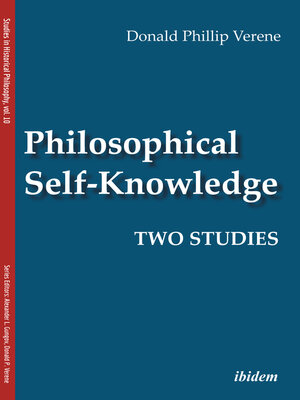Philosophical Self-Knowledge
ebook ∣ Two Studies · Studies in Historical Philosophy
By Donald Phillip Verene

Sign up to save your library
With an OverDrive account, you can save your favorite libraries for at-a-glance information about availability. Find out more about OverDrive accounts.
Find this title in Libby, the library reading app by OverDrive.



Search for a digital library with this title
Title found at these libraries:
| Library Name | Distance |
|---|---|
| Loading... |
The inscription on the Temple of Apollo at Delphi, Gnothi seauton (Know thyself), is taken up by Socrates and pursued as the center of philosophy. Self-knowledge is the theme that endures throughout the history of philosophy. It is a theme that philosophy shares with literature. We know ourselves to be human, but the question remains as to what it means to be human. What we are is a metaphysical and ethical problem. Satire shows us how others see us. Memory, the mother of the Muses, gives us access to see ourselves as we have been, are now, and may be in the future. This work considers the idea of satire through the writings of Aristophanes, Lucian, Erasmus, Rabelais, Swift, Voltaire, and Joyce. It examines the nature of memory in terms of the views of Hesiod, Plato, Aristotle, Camillo, Vico, Hegel, and Joyce. Attention to Joyce in both instances is to Finnegans Wake. The author invites readers to take up the question of self-knowledge, to pursue it further in their own terms and sources.







